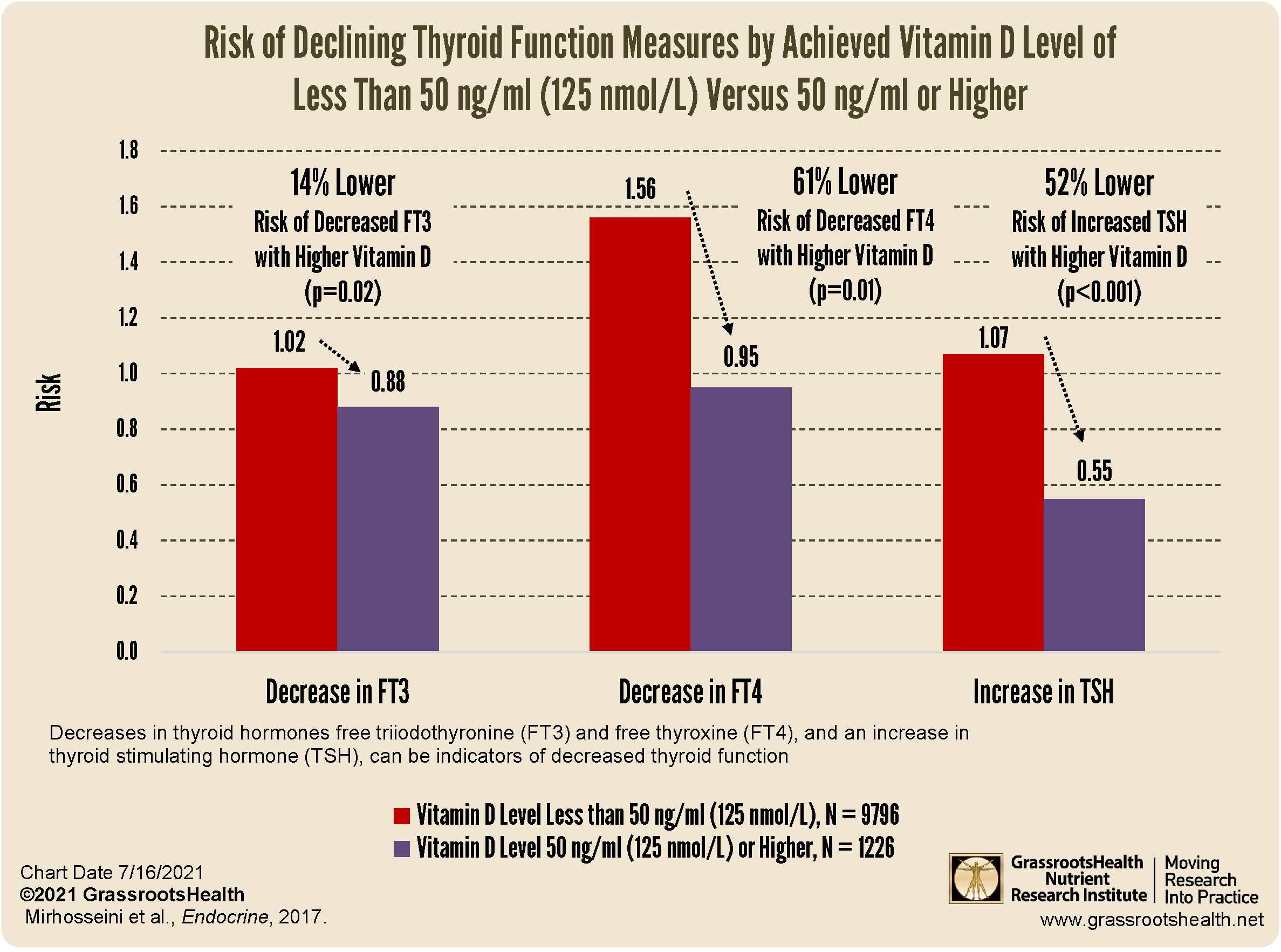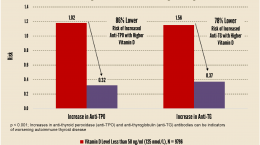Published on July 21, 2021
Study shows optimal thyroid function may require a vitamin D level of at least 50 ng/ml (125 nmol/L)
 The thyroid is a gland that produces, stores, and releases thyroid hormones, which are important to the function of many systems and organs, including the heart, brain, liver, kidneys and skin. Thyroid hormones help regulate vital functions, such as breathing, heart rate, muscle strength, menstrual cycles, body temperature, metabolism, and more.
The thyroid is a gland that produces, stores, and releases thyroid hormones, which are important to the function of many systems and organs, including the heart, brain, liver, kidneys and skin. Thyroid hormones help regulate vital functions, such as breathing, heart rate, muscle strength, menstrual cycles, body temperature, metabolism, and more.
The thyroid is controlled through the hypothalamus-pituitary-thyroid axis, which is prone to circadian and seasonal changes. Previous studies have demonstrated an association between lower thyroid function during the winter months (when vitamin D levels are at their lowest) compared to the summer months (when people tend to have higher vitamin D levels), as well as an increased risk of autoimmune thyroid disease during the winter, especially among individuals with lower vitamin D levels.
The Thyroid May Need Higher Vitamin D Levels to Function at its Best
Vitamin D has many functions within the body, with response curves varying by system (such as skeletal vs immune). For example, while bone health may benefit from a vitamin D level of only 20 ng/ml (50 nmol/L), the immune system may require a much higher level of at least 50 ng/ml (125 nmol/L). Research, such as that discussed below, supports a higher level of vitamin D for thyroid function, similar to what may be needed for optimal immune system function.
A study by Mirhosseini it al., and including GrassrootsHealth Research Director Samantha Kimball, analyzed data from a group of 11,017 wellness program participants to determine if there was a relationship between vitamin D and thyroid function. Vitamin D and thyroid measures (including TSH, FT4, FT3, and thyroid antibodies) were taken at baseline and at follow-up, about one year later. Vitamin D supplementation was given to all participants (average dose 6000 IU/day) with the goal of achieving a vitamin D level of at least 40 ng/ml (100 nmol/L).
Those with Low Thyroid Function were Much More Likely to be Vitamin D Deficient
In this study, similar to previous studies, individuals presenting with low thyroid function (hypothyroid) were three times more likely to be vitamin D deficient (<20 ng/ml or <50 nmol/L) than those with healthy thyroid function, and those presenting with subclinical hypothyroidism were about twice as likely to be vitamin D deficient. Also, baseline TSH levels were higher and FT4 levels significantly lower (both indicating below optimal thyroid function) in the winter than in the summer among those who did not supplement with any vitamin D.
Thyroid Function Improved with Vitamin D Supplementation Program
The dose of vitamin D supplementation for each participant was determined using a calculation similar to that used with the GrassrootsHealth vitamin D*calculator, using the baseline vitamin D level and a target of at least 40 ng/ml (100 nmol/L). In this study, vitamin D supplementation to target a level of at least 40 ng/ml resulted in a significant reduction of TSH and the detection of hypothyroidism and subclinical hypothyroidism.
At the beginning of the study, excluding those on thyroid medications, 1.3% of the participants presented with blood work characteristic of hypothyroidism. At the end of the study, only 0.3% of participants were hypothyroid. 21.7% of participants showed characteristics of subclinical hypothyroidism at baseline, compared to 6.1% at follow up. There was also a significantly lower risk of reporting brain fog, low mood, unrefreshing sleep, weight gain, or low energy (symptoms of low thyroid function) at the end of the study.
Overall, this study found a 30% reduced risk of hypothyroidism, and a 32% reduced risk of elevated anti-thyroid antibodies (covered in more detail in an upcoming post) among participants whose vitamin D level was 50 ng/ml (125 nmol/L) or higher.
Vitamin D levels below 50 ng/ml (125 nmol/L) were also related to
- an overall increased risk of low thyroid function and thyroid disease
- a 107% increased risk of elevated TSH
- a 60% and 14% lower risk of low FT4 and FT3
Of note, vitamin B12 status was also significantly associated with low thyroid function, and improving vitamin B12 status was shown to significantly increase thyroid hormones FT3 and FT4.
In conclusion, this study suggests that vitamin D may influence thyroid function, and supplementation to achieve a vitamin D level between 40-60 ng/ml (100-150 nmol/L) may be useful in helping to prevent hypothyroidism and autoimmune thyroid disease.
Make Sure You Are Getting Enough Vitamin D and Other Important Nutrients – Measure Your TSH as Well!
 Having and maintaining healthy vitamin D levels and other nutrient levels can help improve your health now and for your future. Choose which to measure, such as your vitamin D, omega-3s, and essential minerals including magnesium and zinc, by creating your custom home test kit today. Take steps to improve the status of each of these measurements to benefit your overall health. You can also track your own intakes, symptoms and results to see what works best for YOU.
Having and maintaining healthy vitamin D levels and other nutrient levels can help improve your health now and for your future. Choose which to measure, such as your vitamin D, omega-3s, and essential minerals including magnesium and zinc, by creating your custom home test kit today. Take steps to improve the status of each of these measurements to benefit your overall health. You can also track your own intakes, symptoms and results to see what works best for YOU.
Enroll and test your levels today, learn what steps to take to improve your status of vitamin D (see below) and other nutrients and blood markers, and take action! By enrolling in the GrassrootsHealth projects, you are not only contributing valuable information to everyone, you are also gaining knowledge about how you could improve your own health through measuring and tracking your nutrient status, and educating yourself on how to improve it.
Help everyone Move Research into Practice with vitamin D and other nutrients! As a special birthday gift to everyone, in honor of the science, we have created a special scholarship fund for anyone to donate to that will go towards helping others participate. Your donation will allow anyone to get help with funding their participation when they need it.
Text-to-give: Text Daction to 44321 to add to our Scholarship Fund.






